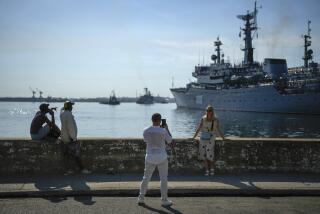Cuba Curbs Reliance on Soviets : Trade: Benefactor’s upheaval has a worried Castro seeking economic self-sufficiency.
- Share via
HAVANA — Eleven weeks ago, Havana’s beleaguered shoppers learned that Soviet wheat stocks had run so low that bread was being added to the growing list of items on their ration cards.
The shortage, they were told, was temporary. A trade pact covering imports of 700 Soviet products in 1991 had been signed last Dec. 31, but only by the two governments. Under the rapidly decentralizing Soviet economy, Cuba then had to seek separate pricing and shipping agreements with 1,500 companies across the Soviet Union.
Fidel Castro, already frustrated by Soviet President Mikhail S. Gorbachev’s retreat from Marxist-Leninist dogma, railed against the “colossal difficulties” of doing business this way.
By July, the most complex commercial deal in Cuba’s history was nearly complete, and Havana’s harbor was clogged with shiploads of Soviet wheat, canned food, paper, chemicals, timber and machinery.
But the bread ration--two rolls per person each day--remains in force, a symbol of Cuba’s insecurity over the changing relationship with its most powerful ally.
“Our wheat supply is supposed to be guaranteed for the rest of this year, but we are not taking any chances,” explained Eugenio R. Balari, president of the government’s Institute for Research and Orientation of Internal Demand.
For better or worse, the Soviet Union is still Cuba’s chief trade partner, supplying 90% of its petroleum, 70% of all its imports and most of its military hardware. Despite an appeal by President Bush at last month’s Moscow summit to curtail their commitments here, Soviet leaders have made a public point of reaffirming them.
Yet Cuban and Soviet trade officials interviewed in Havana this month said the future of the partnership is clouded by uncertainties. “It’s no longer just a question of whether the Soviets want to help us, but whether they can,” a Cuban specialist said.
Cuba has suffered one series of shocks already. The Soviets, inspired by perestroika to make trade profitable, raised export prices in the 1991 trade pact to world market levels, thus reducing subsidies to Cuba. Hurt by falling petroleum output at home, they cut Cuba’s crude oil supply from 13.3 million to 10 million metric tons in 1990 and kept it at that level for 1991.
Atop the bureaucratic upheaval caused by decentralization came political turmoil and strikes in the Soviet Union, canceling deliveries of items such as sheet metal for Cuba’s sugar harvester assembly plants. Even the flow of Soviet arms to Cuba dropped, Castro complained in a speech last April.
The trade picture is about to get more complicated. Under a Union Treaty hammered out in Moscow, each Soviet republic will have its own foreign commerce. When talks on 1992 trade begin, Cuba must deal with each separately.
“This will be reduced to a coordinating office,” said Alexander N. Shajov, an economist at the sprawling three-story Soviet trade mission in Havana. “Soviet-Cuban relations will have a new face in 1992. What that face will look like, nobody can say.”
But Shajov has a rule of thumb: “If the Soviet people start to live better, then we can sell more to Cuba and perhaps the Cubans will live better. If we fall into an abyss, the Cubans will fall with us.”
Taking the hint, Castro has begun moving away from dependence on Moscow. His government has launched a five-year program to grow most of Cuba’s food, imported hundreds of thousands of Chinese bicycles to save fuel and promoted two industries with potentially wide markets in the West--tourism and pharmaceuticals.
He has used the term “option zero” to describe a hypothetical cutoff of all Soviet oil, food and equipment. With that scenario in mind, some Cuban army units are experimenting with guerrilla survival tactics--growing their food, cooking with wood fires and fueling tanks and trucks with a gas made from sugar-cane waste.
“The Cubans are starting to plan for life without the Soviet Union,” said Wayne S. Smith, a former head of the U.S. Interests Section in Havana and now director of Cuban studies at Johns Hopkins School of Advanced International Studies in Washington. “If I were Cuban, I wouldn’t have great confidence in Moscow right now.”
Castro vowed once before, at the start of his revolution in 1959, to make this Caribbean island self-sufficient in food. But a U.S. trade embargo imposed in 1962 pushed him into the Soviet orbit, and Moscow insisted that Cuba’s economy stay tied to sugar production to assure sugar supplies for socialist countries.
Cuba cast its lot almost totally with socialist allies after halting payments on its debt to the West in 1985. By 1989, when communism toppled across Eastern Europe and the Soviet economy fell into crisis, 86% of Cuba’s trade was with the Soviet Bloc.
The collapse, in economic and psychological terms, still shakes Cuba. Cars made in the Soviet Union and Eastern Europe break down and cannot be fixed for lack of spare parts. Cuban scholarship students exposed to glasnost at Soviet universities defect on their way home, as a dozen did this summer on a Canadian refueling stop. Older Cubans say the economic disruption is as great as that caused by the U.S. embargo three decades ago.
The $3.8-billion accord signed in Moscow last Dec. 31 promised to stabilize trade at a higher cost to Cuba. Although bookkeeping was shifted from rubles to dollars, goods are still bartered, sparing Cuba the need to shell out precious hard currency. Prices were adjusted in the Soviets’ favor; for example, they now pay 18 instead of 27 barrels of oil for a metric ton of Cuban sugar. Cuba was also required to pay 10% of all shipping costs, which were assumed entirely by Moscow until this year.
At year’s end, when all prices are added up, Cubans estimate they will owe the Soviets $100 million to $200 million. Soviet officials say that deficit will be rolled over as a trade credit for 1992 but that efforts will be made to reduce it in coming years.
In a measure of belt-tightening on both sides, Moscow has withdrawn 2,400 civilian technicians from Cuba in the last 19 months as Soviet aid projects are completed or shelved. Soviet officials say 1,100 technicians still work on 70 construction projects in Cuba, including 500 at a nuclear power station near Cienfuegos.
Cuban officials describe the first stage of the new trade agreement as maddening.
Petroleum, one of the few products still dealt by a central Soviet supplier, has kept flowing. But while waiting to strike deals with hundreds of profit-oriented trading companies and shippers, many with no previous experience in foreign trade, Cuba had to pay cash for emergency grain from Argentina and Canada and rubber from Mexico. While awaiting supplies of Soviet soft-drink bottles and caustic soda to make soap, Cubans drank out of little cardboard boxes and bathed with plain water.
The trade bottleneck was broken after high-level delegations met in Havana and Moscow in May and June. They formed a chamber of commerce to coordinate Cuba’s contacts with the vast new array of suppliers.
“The first five months of the year were a trial for us,” said Raul Taladrid Suarez, vice president of Cuba’s State Committee of Economic Cooperation. “The Soviets are decentralizing, but they are not ready for decentralization. . . . We have to go at their pace.”
In the long run, Cuban specialists believe that Soviet dependence on Cuban sugar, nickel, seafood, citrus and medical supplies will keep the partnership solid. The new trade rules could benefit Cuba, they say, if Soviet republics and companies start competitive bidding for Cuban exports.
“The Soviets would pay more for sugar on the world market,” said Jose Luis Rodriguez of Cuba’s Center for Investigations of the World Economy. “It would cost them three times as much to produce their own nickel as to buy it here. It would not be easy for them to buy elsewhere because they are short of hard currency themselves.”
The Soviets agree. They say they don’t want mutually beneficial barter trade with Cuba disrupted the way it was with Eastern Europe. To that end, they are moving--”through evolution, not revolution,” in Shajov’s words--to phase out subsidies to Cuba.
U.S. officials believe Moscow has another reason to accommodate Cuba: The strategic military value of an electronic intelligence post on the island nation that can monitor U.S. compliance of arms-reduction accords.
Even so, Havana is sensitive to the prospect that “enemies of the relationship with Cuba” could arise in Moscow. Cuban officials have made respectful statements about Boris N. Yeltsin, the Russian Federation president who has criticized Soviet largess to Cuba.
“We are not worried particularly because of Yeltsin,” Deputy Foreign Minister Ramon Sanchez Parodi said in an interview. “We are worried about the overall situation in the Soviet Union, the overall stability of the Soviet Union.”
More to Read
Sign up for Essential California
The most important California stories and recommendations in your inbox every morning.
You may occasionally receive promotional content from the Los Angeles Times.












